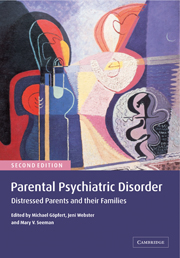Book contents
- Frontmatter
- Contents
- List of contributors
- Foreword
- Preface
- Part I Basic issues
- 1 What we want from adult psychiatrists and their colleagues: ‘Telling it like it is’
- 2 Parenthood and adult mental health
- 3 Parental psychiatric disorder and the developing child
- 4 Parental psychiatric disorder and the attachment relationship
- 5 The construction of parenting and its context
- Part II Comprehensive assessment and treatment
- Part III Specific disorders: the impact on parent–child relationships
- Part IV Specific treatments and service needs
- Part V Child-sensitive therapeutic interventions
- Part VI Models for collaborative services and staff training
- Afterword
- Index
- References
2 - Parenthood and adult mental health
from Part I - Basic issues
Published online by Cambridge University Press: 09 August 2009
- Frontmatter
- Contents
- List of contributors
- Foreword
- Preface
- Part I Basic issues
- 1 What we want from adult psychiatrists and their colleagues: ‘Telling it like it is’
- 2 Parenthood and adult mental health
- 3 Parental psychiatric disorder and the developing child
- 4 Parental psychiatric disorder and the attachment relationship
- 5 The construction of parenting and its context
- Part II Comprehensive assessment and treatment
- Part III Specific disorders: the impact on parent–child relationships
- Part IV Specific treatments and service needs
- Part V Child-sensitive therapeutic interventions
- Part VI Models for collaborative services and staff training
- Afterword
- Index
- References
Summary
Introduction
Because individuals and families seek relief from psychological distress from a number of different sources, confusion can arise as to the specific role of one professional versus another. Tugs of territorial war often exist among psychologists, social workers, child psychiatrists and adult psychiatrists, to mention only a few of the players. Each profession is armed with its own specialized weaponry of psychological interventions and rival factions not infrequently claim superiority. To some degree this has become a battleground for the distribution of limited resources. Statutory issues such as prescription rights cause bitter interprofessional disputes. The roles of mental health workers are not always sufficiently clearly delineated, nor can they ever be because human suffering knows no clear borders. So the professional field is rife with tensions, splits and competition while the needs of patients or service users go, at times, unmet. In our experience and in the opinion of others (Consumers' Association (UK), 2002), when the expertise of service users is recognized and when they are given a degree of power in the way services are designed and delivered, professional competition is reduced and interprofessional collaboration grows.
This book focuses on services for individuals with mental illness who are parents. In many systems of mental health service provision, the identity of the patient as a parent does not receive sufficient recognition (see Göpfert et al., Chapter 5).
- Type
- Chapter
- Information
- Parental Psychiatric DisorderDistressed Parents and their Families, pp. 8 - 21Publisher: Cambridge University PressPrint publication year: 2004
References
- 8
- Cited by

